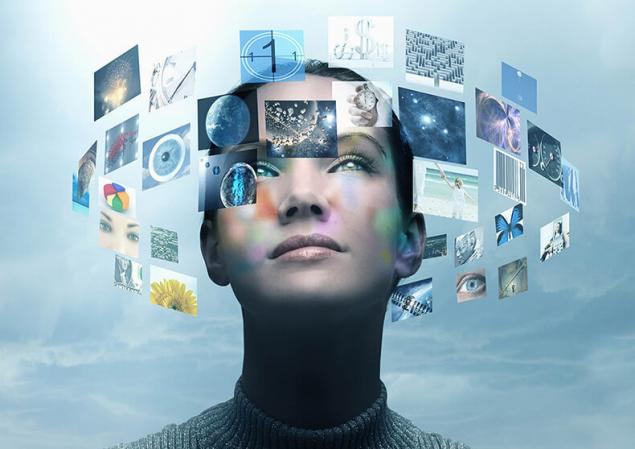698
8 major changes in the physiology of people caused by the modern technology
1. We see colorful dreams
Television is so strongly affect the human that it affects even sleep. In 2008, a study conducted at the University of Dundee in Scotland, found that adults over the age of 55 years, who grew up in the era of black-and-white film, often seen in black and white dreams. But the younger study participants, who grew up in the era of Technicolor, almost always see their dreams in color. The American Psychological Association again confirmed the results of the study in 2011.

2. We are FOMO
FOMO (fear, something you pass; in Fomo original - fear of missing out), defined in The New York Times as "a mixture of anxiety, inadequacy and irritation that can flare up at the time, as we look at social media" <. br>
Before the advent of social networks, people who decide to spend a quiet Saturday night at home with a glass of wine in the company of an old favorite movie might feel a little regret that will not got out of the house and maybe something missing. But thanks to social networks that feeling has increased significantly since in endless tapes we constantly see the posts with photos of various gatherings, fun dinners, crazy parties and flowing rivers of alcohol on them. Even if you a holiday absolutely not interested, you are still thinking, "Maybe I ought to do right now with something else?" This is FOMO
. 3. "false vibration syndrome»
We are constantly in a state of heightened sensitivity to our mobile phones, so that it is often confused when it rings, and when not. In 2012, a study published in the journal Computers and Human Behavior, found that 89% of the 290 students who participated in the experiment, there is a "false vibration syndrome" (a physical sensation that their phone vibrate, even when it is not), time two weeks. Research hospital workers showed the same results.
Books on psychology Larry Rosen in detail describe the syndrome. In an interview with NPR scientist and psychologist suggests that physical sensations, such as itching, can now be misinterpreted by our brains as a vibrating phone. "Our brain is retrained and reacts differently to the same sensations that were before" - he says. And though "false vibration syndrome" does not cause any serious effects or problems, he still seems to be something quirky and unusual.
4. We can not sleep
We technophiles who are accustomed to sleep with laptops in bed under the soothing melodic BBC series about the nature of China or the 4th series to a series of a uncomplicated series, some of us can finish the day by reading a chapter Hunger Games on their iPad, someone - did not finish sms. But these comforting evening treatments may actually be the first link in the chain of our sleep, sort of a part of the pattern.
Neuroscientists believe that the light screens of laptops, tablets and smartphones is controversial in our bodies, in particular affects the production of hormones hypnotics. Exposure to bright light can trick the brain into thinking that it is still a day that can potentially have long-term consequences for the body's circadian rhythms (our internal sleep clock). Our eyes are particularly sensitive to the blue color emitted by the screens. This makes it difficult falling asleep, especially for those who are already struggling with insomnia.
5. Our memory is poor, like to focus
In ancient times, learning by heart was extremely valuable skill. So valuable that students are often able to read the whole book from memory. In the Google-our era when almost every piece of information could be instantly available, we absolutely do not worry about saving or memorizing some facts, not to mention entire books. Why remember the capital of Mozambique, if it is just possible to ask?
In 2007, scientist-neurologist interviewed 3,000 people and found that younger respondents were less likely to remember the standard personal information, such as date of birth relative or even their own phone number. Similarly, studies have shown that the calculators can reduce simple math skills. Some people can not move into their cities without the help of GPS.
Social media and the internet in general also reduce our concentration. People immersed in digital media, it is difficult to read a book in a long period of time, they often runs just under the eyes, and do not read every word. This phenomenon can be particularly disturbing for young people whose brains are still at the stage of formation and, consequently, may not be able to develop concentration skills.
6. We have improved visual skills
A study in 2013 showed that the first-person shooters like Halo and Unreal Tournament, enhance decision-making skills, and visual skills. These games force players to make quick decisions based on visual signals, which increases the visual-spatial skills of attention, or the ability to analyze information about our physical environment.
Gamers will also better define the contrast between objects in dim light. A comprehensive strategy as of Starcraft, can improve "cognitive flexibility" of the brain, or the ability to switch between tasks, thereby enhancing the ability of such a controversial person to multitask. This was particularly evident during the experiment with the elderly.
7. But the decreased control of impulsivity
Unfortunately, the same 2013 study of video games as of Halo, revealed the existence of problems with the players to curb impulsive or aggressive behavior. The researchers concluded: forcing players to make quick decisions in situations of violence, they braked "active executive control" - knee-jerk reaction and other pulses. This has led scientists to argue that these players are more prone to immediate hostility or aggression in real life.
8. We create more than
Technology more accessible to creative people and all the others who interact with them. The author argues that the Internet amplifies what he calls "cognitive surplus" - the excess brain capabilities that we can identify the objectives that bring us satisfaction
. Social media offer users to interact with text, images and video in the form in which it can not TV. Social networks contribute to the culture of something to share, users are becoming more prone to the creation and sharing of information, whether it's Flickr album review of popular books, in addition to Wikipedia or the DIY-project.
Television is so strongly affect the human that it affects even sleep. In 2008, a study conducted at the University of Dundee in Scotland, found that adults over the age of 55 years, who grew up in the era of black-and-white film, often seen in black and white dreams. But the younger study participants, who grew up in the era of Technicolor, almost always see their dreams in color. The American Psychological Association again confirmed the results of the study in 2011.

2. We are FOMO
FOMO (fear, something you pass; in Fomo original - fear of missing out), defined in The New York Times as "a mixture of anxiety, inadequacy and irritation that can flare up at the time, as we look at social media" <. br>
Before the advent of social networks, people who decide to spend a quiet Saturday night at home with a glass of wine in the company of an old favorite movie might feel a little regret that will not got out of the house and maybe something missing. But thanks to social networks that feeling has increased significantly since in endless tapes we constantly see the posts with photos of various gatherings, fun dinners, crazy parties and flowing rivers of alcohol on them. Even if you a holiday absolutely not interested, you are still thinking, "Maybe I ought to do right now with something else?" This is FOMO
. 3. "false vibration syndrome»
We are constantly in a state of heightened sensitivity to our mobile phones, so that it is often confused when it rings, and when not. In 2012, a study published in the journal Computers and Human Behavior, found that 89% of the 290 students who participated in the experiment, there is a "false vibration syndrome" (a physical sensation that their phone vibrate, even when it is not), time two weeks. Research hospital workers showed the same results.
Books on psychology Larry Rosen in detail describe the syndrome. In an interview with NPR scientist and psychologist suggests that physical sensations, such as itching, can now be misinterpreted by our brains as a vibrating phone. "Our brain is retrained and reacts differently to the same sensations that were before" - he says. And though "false vibration syndrome" does not cause any serious effects or problems, he still seems to be something quirky and unusual.
4. We can not sleep
We technophiles who are accustomed to sleep with laptops in bed under the soothing melodic BBC series about the nature of China or the 4th series to a series of a uncomplicated series, some of us can finish the day by reading a chapter Hunger Games on their iPad, someone - did not finish sms. But these comforting evening treatments may actually be the first link in the chain of our sleep, sort of a part of the pattern.
Neuroscientists believe that the light screens of laptops, tablets and smartphones is controversial in our bodies, in particular affects the production of hormones hypnotics. Exposure to bright light can trick the brain into thinking that it is still a day that can potentially have long-term consequences for the body's circadian rhythms (our internal sleep clock). Our eyes are particularly sensitive to the blue color emitted by the screens. This makes it difficult falling asleep, especially for those who are already struggling with insomnia.
5. Our memory is poor, like to focus
In ancient times, learning by heart was extremely valuable skill. So valuable that students are often able to read the whole book from memory. In the Google-our era when almost every piece of information could be instantly available, we absolutely do not worry about saving or memorizing some facts, not to mention entire books. Why remember the capital of Mozambique, if it is just possible to ask?
In 2007, scientist-neurologist interviewed 3,000 people and found that younger respondents were less likely to remember the standard personal information, such as date of birth relative or even their own phone number. Similarly, studies have shown that the calculators can reduce simple math skills. Some people can not move into their cities without the help of GPS.
Social media and the internet in general also reduce our concentration. People immersed in digital media, it is difficult to read a book in a long period of time, they often runs just under the eyes, and do not read every word. This phenomenon can be particularly disturbing for young people whose brains are still at the stage of formation and, consequently, may not be able to develop concentration skills.
6. We have improved visual skills
A study in 2013 showed that the first-person shooters like Halo and Unreal Tournament, enhance decision-making skills, and visual skills. These games force players to make quick decisions based on visual signals, which increases the visual-spatial skills of attention, or the ability to analyze information about our physical environment.
Gamers will also better define the contrast between objects in dim light. A comprehensive strategy as of Starcraft, can improve "cognitive flexibility" of the brain, or the ability to switch between tasks, thereby enhancing the ability of such a controversial person to multitask. This was particularly evident during the experiment with the elderly.
7. But the decreased control of impulsivity
Unfortunately, the same 2013 study of video games as of Halo, revealed the existence of problems with the players to curb impulsive or aggressive behavior. The researchers concluded: forcing players to make quick decisions in situations of violence, they braked "active executive control" - knee-jerk reaction and other pulses. This has led scientists to argue that these players are more prone to immediate hostility or aggression in real life.
8. We create more than
Technology more accessible to creative people and all the others who interact with them. The author argues that the Internet amplifies what he calls "cognitive surplus" - the excess brain capabilities that we can identify the objectives that bring us satisfaction
. Social media offer users to interact with text, images and video in the form in which it can not TV. Social networks contribute to the culture of something to share, users are becoming more prone to the creation and sharing of information, whether it's Flickr album review of popular books, in addition to Wikipedia or the DIY-project.
What to eat to lose weight: the principles nemuchenicheskoy power system
This agent is effective in treating cholecystitis, kidney diseases, and not only
























